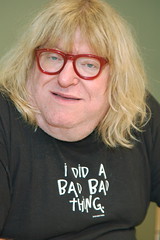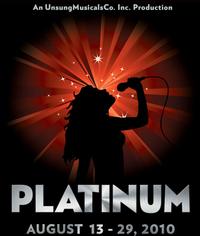
- Image by Sharon Graphics via Flickr
Theatermania
Ben West Is Polishing Platinum
by Peter Filichia’s Diary
August 16, 2010
Ever hear of Platinum? It was a 1978 musical with book by Will Holt and Bruce Vilanch, lyrics by Holt and music by Gary William Friedman. New Yorkers had 45 chances to see it, thanks to 12 previews and 33 official performances.
With a run such as that, you might be surprised to hear that it even got two Tony nominations. One went to Alexis Smith, in her first musical since you-know-what, for playing Lila Halliday, a faded Hollywood star who was trying a pop music comeback. The other was bestowed on Richard Cox as Dan Danger, a rocker who might become her boy toy. Both lost.
Even if you have heard of Platinum, you probably haven’t heard the score, because it yielded no official original cast album. Still, it was a show that caught the interest of Ben West. Once he learned of it, he wanted to read it, hear it and savor it. Once he did all of the above, he wanted to rework it. The fruits of his labor will be seen in FringeNYC for five performances this Tuesday through Saturday at the Lortel.
Last year, West adapted another underappreciated Broadway musical, but one that ran seven times as long and did get recorded: How Now, Dow Jones, the 1967 tuner about a false stock market report. Still, you wouldn’t expect that show to interest a guy who wasn’t even born when Platinum debuted. West is a mere 27, but his heart is in musicals of yore.
He knows he’s atypical for his generation. “Some years ago when I was an actor and auditioning,†he says, “it’d drive me crazy when I mentioned Comden and Green to the other auditioners and so many wouldn’t have a clue who I meant. Many people of my generation don’t understand that Spring Awakening happened because somebody else laid the groundwork for it 50 or 60 years ago.”
West was born out west in Minneapolis, then spent some time in Chicago where in kindergarten he staged his own puppet show. “The Weisslers were considering moving it,” he jokes.
After he moved to Miami, he of course did school plays; favorite roles include The Emcee in Cabaret and Mrs. Drudge in The Real Inspector Hound. He studied at NYU’s CAP 21 for a couple of years, and later appeared in Paper Mill’s Of Thee I Sing. Later he became assistant director to Gordon Greenberg for Breaking up Is Hard to Do, a Neil Sedaka jukebox musical.
All the while, however, West was reading every book he could on musicals, with Steven Suskin’s and Ken Bloom’s ranking among his favorites. They led him to Cy Coleman, whose music greatly delighted him. Once he decided to track down every Coleman score, that led him to Wildcat and Little Me. Through them, he became even more entranced with Coleman’s lyricist on those projects, one Carolyn Leigh.
“She’s the best!” West exclaims, with the exuberance of youth. “I made a vow to track down everything she wrote, too, and that led me to How Now, Dow Jones. I loved her lyrics and Elmer Bernstein’s music, too.”
West doesn’t add that he loves Max Shulman’s book for the show. He obviously didn’t, for he soon started making changes. “I got in touch with Samuel French,” he says, “just to see if they could point me in the direction to get the rights so I could really do something with it. They didn’t answer for months, but somehow I never ever thought it wasn’t going to happen. Eventually they contacted me and told me how to reach June Silver, Carolyn Leigh’s surviving sister; Eve Bernstein, Elmer’s widow; and Max Shulman’s agent. They all gave me the go-ahead to do an adaptation.”
West eliminated some songs, added others that had been dropped from the original 1967 production, wisely moved “Step to the Rear†to the rear of the show as an eleven o’clock number – and staged the show as a taut 90-minute presentation. The result was one of the major hits of last year’s FringeNYC — “although,” West concedes, “nobody from any of the estates decided to attend.” Nevertheless, the response was so successful that West says that we just might just see How Now again. “Oh, not at the Shubert,†he admits. “but the Little Shubert isn’t out of the question. That’s what I want for these shows. Maybe a summer run in an off-Broadway house.”
That goes for Platinum, too, which has a less-than-platinum history. It started out as Sunset at the fondly missed Studio Arena Theatre in Buffalo in 1977, and then morphed into Platinum at the more fondly missed Hellinger. In 1983, it was revamped and revised without Vilanch and returned to its original name. But Sunset rose and set on Nov. 7 at the Village Gate.
Still, it got a cast album, a copy of which West saw one day in the also fondly missed Tower Records. “After doing extensive research,†he says, “I’ve been able to combine the first Sunset with Platinum and have come up with something that I believe works.â€
What he’s also done is pare down the 13 characters Platinum had to a mere five. Lila and Dan (now surnamed Reilly) are joined by Jeff Leff, the recording studio head with whom Lila has shared a professional relationship and perhaps a romantic past. Also on hand are Crystal Mason who used to be Dan’s back-up singer, but who has now broken out on her own – as Dan is becoming broken-down – and Jamie, who runs the recording sessions but wants so much more from life.
West’s other future projects include Seesaw — “although no one from any of the estates knows I’m working on it,†he says. “It’s just what I do in my spare time” — and Barefoot Boy with Cheek, the 1947 musical that Max Shulman adapted from his own hilarious novel about fraternity life. “It got great reviews in Boston,” reports West, “and while the New York reviews were favorable, they suggested that everybody had seen this life-in-college musical before. Well, I say we now haven’t seen one for a while, so the time is right for it again.”
If West really has his way, we’ll eventually see an unproduced Leigh show, too. “I have June Silver’s permission to do The Great Gatsby and an okay from the Hugh Wheeler estate, too. What I don’t have is clearance from the F. Scott Fitzgerald estate — but I’m working on that.â€
Don’t be against him. He’s a young man with his feet firmly planted on the stage. When I asked him what he’d go back and see if there were a time machine, he gave me an answer I’ve never heard from the hundreds of people I’ve asked that question. “I wouldn’t want to see any of these shows as they were originally done,†he says, “because then I’d know for sure that I couldn’t begin to top what was originally put on stage.â€
Then he pauses. “Though I guess I would like to see the original Follies.†Pause. “And any Ziegfeld production,†he adds with a little more excitement in his voice. Pause. “Oh, and Little Me – and …â€
You may e-mail Peter at pfilichia@aol.com. Check out his weekly column each Tuesday at www.masterworksbroadway.com.




